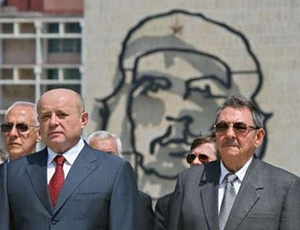 |
 |
 |
 Editorials | October 2006 Editorials | October 2006  
U.S. Engagement with a Post-Castro Cuba
 Philip Peters - Council on Foreign Relations Philip Peters - Council on Foreign Relations


| | Russian Prime Minister Mikhail Fradkov (L) and acting Cuban President Raul Castro stand during the wreath-laying ceremony at the Jose Marti monument in Havana September 28, 2006. Russia on Thursday extended a $355 million credit line to its former Cold War-era ally Cuba to buy cars, trucks and other equipment and services during a visit by Fradkov. Russian officials also signed an agreement to restructure $162 million in debt run up by Cuba with Moscow since the demise of the Soviet Union in 1991. (Reuters/Enrique De La Osa) |
If Cuba’s government were teetering, if Cuba were in economic crisis, and if Cuba’s dissidents constituted a broad-based political movement, then a U.S. policy that shuns engagement with Cuba might make sense.

But none of these conditions describe Cuba today. As the post-Castro era comes into view, the misperceptions that guide U.S. policy are also becoming clearer.

When Fidel Castro delegated duties to other officials, the Administration seemed to assume that systemic change would follow. President George W. Bush even promised to “take note of those, in the current Cuban regime” who would disrupt the Cuban people’s “effort to build a transitional government.” But there was no transition, and a de facto socialist succession may already have been accomplished.

To achieve its goal of “hastening the end of the dictatorship,” the Administration relies mainly on economic sanctions and aid to Cuban dissidents. Neither measure promises a decisive impact.

Cuba’s economy has recovered through growth in tourism, energy, and minerals, and through aid, trade, and credits from Venezuela, China, Russia, and others. The result is 8 percent growth, according to the CIA. In this environment, our go-it-alone sanctions do not affect Cuban decision-making, but they do choke off all kinds of contact with American society, and they hurt Cuban families whose relatives face new limits, and in some cases a complete ban, on visits and cash assistance.

Cuba’s dissidents are brave democrats who have paid a high price for their views. But they are few, not well known in Cuba, and weakened by internal divisions and penetration by Cuban security services. Contrary to outsiders’ perceptions, they have never claimed an ability to mobilize the public. This was never clearer than in August, when Miami-based anti-Castro Cubans were met with silence when they called for the dissidents to lead a civil disobedience campaign.

The Helms-Burton Act [1996 legislation that tightened the embargo] dictates the U.S. diplomatic posture: It bars the President from easing any sanctions until deep reforms are accomplished, and says that even if Cuba reforms, there will be no U.S. response if Raul Castro remains in government.

Add it all up, and we have a policy that makes America inconsequential in the short run and irrelevant in the long run. Its regime-change rhetoric is, as a Texan would say, “all hat and no cattle.” There would be no cost and many benefits if the President were to engage as he does with other nondemocratic countries. | 
 | |
 |



